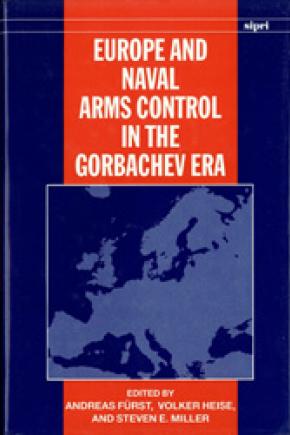Europe and Naval Arms Control in the Gorbachev Era
During the Gorbachev era naval arms control issues received renewed attention. The Soviet Union increased its demands to widen arms control negotiations to include the maritime area. This in turn initiated a new debate about the opportunities for and problems of naval arms control measures.
As a contribution to this debate, SIPRI has explored naval arms control issues in and for Europe. Departing from the usual approach of analysing the subject in global terms or from a superpower perspective, this book examines naval arms control from a European viewpoint. The following questions serve as guidelines: What role might naval arms control have in the interests and perceptions of European states? What opportunities for and obstacles to naval arms control exist in Europe? Which security problems might be solved and which created by naval arms control measures? In Europe and Naval Arms Control in the Gorbachev Era these questions are addressed by experts from the European coastal states in the Norwegian, Baltic, and Mediterranean seas, as well as from the former Soviet Union and the United States. By examining contrasting naval interests and attitudes towards naval arms control the differing perceptions, desires, and possibilities for each region and country are made evident.
Part I. Introduction
1. Europe and naval arms control in the Gorbachev era
Steven E. Miller
Part II. The Norwegian Sea
2. Naval arms control and the Norwegian Sea: A US perspective
William J. Durch
Appendix 2A. Major NATO North Atlantic naval exercises, 1970-88
3. The Soviet Union, Naval Arms control and the Norwegian Sea
Alexei Arbatov
Appendix 3A. Overview of Soviet naval arms control proposals in the Gorbachev era
4. Naval arms control in the Norwegian Sea
Ian Anthony
5. Iceland, naval arms control and the Norwegian Sea
Albert Jónsson
6. Norway and naval arms control: Interests, policies and perspectives
John Kristen Skogan
Part III. The Baltic region
7. Naval arms control in the Baltic Sea: A Soviet perspective
Vladimir Kulagin
8. Naval arms control in the Baltic region: A German perspective
Volker Heise
9. Strategic developments and the impact of naval arms control in the Baltic region
Johan Tunberger and Robert Dalsjö
Part IV. The Mediterranean region
10. Naval arms control in the Mediterranean: A Soviet perspective
Nadia Alexandrova-Arbatova
Appendix 10A. The NATO-WTO naval balance in the Mediterranean Sea 1989
11. The United States and naval arms control in the Mediterranean
James L. Lacy
12. Naval arms control in the western Mediterranean: A Spanish perspective
Rafael L. Bardaji
13. Prospects for naval arms control in the eastern Mediterranean
Athanassios G. Platias
Appendix 13A. Guidelines for the prevention of accidents and incidents on the high seas and in international airspace, Istanbul, 8 September 1988
Appendix 13B. Memorandum of understanding on confidence-building measures, Athens May 1988
14. Italy, the Mediterranean and naval arms control
Marco Carnovale
15. Maritime power and naval arms control in the Mediterranean: implications in the Middle East context
Shai Feldman
16. Naval arms control in the southern Mediterranean: An Arab perspective
Abdel Monem Said Aly and Mohamed Kadry

